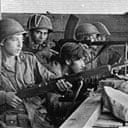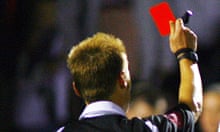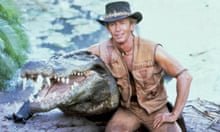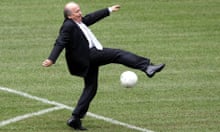"I seem to remember my father telling me that a football match in South America once kick-started a war," writes Darren Telford. "Is this true, and if so, how did it happen?"
It's almost true, Darren. The 'Football War' was fought by Central American countries El Salvador and Honduras in 1969. In fact, it also went by the name of the '100 Hours' War', and in reality there were a host of issues at the root of the troubles. Migration, trade and simmering land disputes on the border all conspired to spark social unrest between the two, but it wasn't until the best-of-three World Cup qualifiers in 1969 that the tipping point was reached.
The first game - a 1-0 win for Honduras - in Tegucigalpa witnessed disturbances but things deteriorated significantly come the second in San Salvador: visiting Honduran players, according to Ryszard Kapuściński's 1978 book Wojna Futbolowa, endured a sleepless night before the game, with rotten eggs, dead rats and stinking rags all tossed through the broken windows of their hotel; Honduran fans were brutalised at the game, and the country's flag and national anthem were also mocked. "Under such conditions the players from Tegucigalpa did not, understandably, have their minds on the game," admitted the Honduras coach Mario Griffin after his team lost 3-0. "They had their minds on getting out alive. We're awfully lucky that we lost."
Tension continued to increase before the decisive third match in Mexico, with the press stoking the frenzy. And on June 27 - the day of the play-off - Honduras broke off diplomatic relations with their neighbour. El Salvador eventually triumphed 3-2 after extra-time, booking their place in the 1970 World Cup (where they would lose all three of their group games without scoring). By July 14, El Salvador had invaded Honduras.
When the Organisation of American States negotiated a ceasefire on July 20, approximately 1,000 to 2,000 people had lost their lives and 100,000 more had become refugees. Troops from El Salvador were withdrawn in August, but it wasn't until 11 years later that a peace treaty between the nations was agreed. A civil war in El Salvador ensued between 1980 until 1992, when the International Court of Justice awarded much of the originally disputed territory to Honduras.
For more background to the war, click here and here.
On a happier note, two years previously football stopped a war - albeit temporarily. The opposing sides in the Biafran war declared a two-day truce in September 1967so that they could watch Pele and his touring Santos team play in two exhibition matches.
THE FASTEST RECORDED SHOT EVER (2)
Last week we attempted to compile a comprehensive top 10 of the hardest ever shots, only for several of you to correctly point out that we'd actually created a list of the fastest recorded shots. The rest of you set about pointing us in the direction of various players we'd omitted from the list ...
Sadly - and here lies the difficulty with such a list - the speed of most shots has not been recorded, which means there are probably lots of belters that we can never include. Peter Lorimer, for instance, is regularly cited as having hit shots at over 90mph, and this scorcher from Hereford's Ronnie Radford against Newcastle looks like it could have been even faster, but we can't prove it.
However, with a bit of help from our ageing "Ballistic 96" VHS round-up of the 1995-96 season, we can confirm that Tony Yeboah's right-foot rocket jumps straight in at joint fourth (alongside David Trezeguet) on our list after it was measured at 96mph. "But Trezeguet was third," we hear you cry, and you'd be absolutely right; except that we also have a new No1. Step forward Sporting Lisbon's Brazilian left-back Ronny "Homem-Bomba" (human bomb) Heberson, who rifled in this free-kick against Naval in November last year, reportedly from 16.5 metres in 0.28 seconds: by our calculations, that's 131.82mph. Thanks to reader Peter van Balen for the tip-off.
Can you top that? Then send the proof to knowledge@theguardian.com.
NAMES ON THE FRONT AND BACK OF SHIRTS (2)
We also attempted to unmask the Premiership footballers who had their names on the front and the back of their shirts but, because of technicalities, failed to do so. However, we could have a winner ...
"In the first couple of seasons of the Premiership, Sheffield Wednesday had a black shirt with yellow pinstripes, made by Puma," recalls Rob Freeman. "They incorporated the name of their biggest selling football boot 'King' into the pattern of the shirt. So while not the main sponsor, Phil King not only had his surname on his back, but in about 100 other places across the shirt too - including the front."
STEVE STAUNTON: GENIUS
"After Ireland's heroic last-minute away triumph against crack outfit San Marino, Steve Staunton said that 'we always play well in March'," explains Dave Bevan. "Everyone, myself included, assumed this to be the ramblings of a drowning man, but I've been wondering if there might be any truth to what he said. What is Ireland's record in March internationals really like?"
We can't find any evidence to back up his claim that San Marino are "difficult to break down", Dave, but he's not wrong about the Republic's decent March record. From their 36 internationals in that month, they've won 21, drawn six and lost just nine. Wales and Slovakia had better watch out next month.
KNOWLEDGE ARCHIVE
"Who scored the fastest ever Champions League hat-trick?" asked Charlie Burrows way back in 2002.
"It depends how you define fastest," said Simon Gleave. "If it is the time between first and third goal, the record is, incredibly, held by Mike Newell, who scored a hat-trick in nine minutes for Blackburn against Rosenborg in the 1995-96 season. His first goal came after 31 minutes with the third hitting the net five minutes before half-time."
Click here for thousands more Knowledge questions and answers.
Can you help?
"Are Archie Thompson's five goals for Melbourne Victory in their 6-0 Grand Final win over Adelaide Utd the most goals scored in a Cup final by an individual?" asks Mark Hand.
"Last weekend's game between Siena and Milan looks very similar (OK, slightly similar) to the name of actress Sienna Miller," writes Neil Reilly. "Are there any better examples of fixtures spelling out a famous person's name?"
"Which English League ground has the steepest stands?" wonders Dan Gavin. "And what about the world's steepest stands?"
"Do you have any idea what happened with the footballing careers of the kids who finished second and third - Mark Price and Dean Lonsdale - behind David Beckham in the 1986 Bobby Charlton Soccer School Skills finals?" enquires Iain Harral.
Email all your questions and answers to knowledge@theguardian.com.



